We spoke with Justen Li, a former student of David Bishop, co-founder of FSI, on conceptualizing the impact-based youth empowerment Impact Lab Course, the importance of learning from failures, and his learning journey as the Chairman of Soap Cycling.
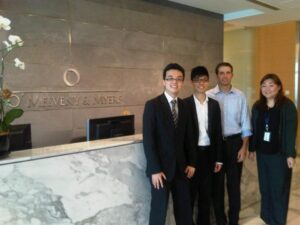
Can you tell us about your journey in the social impact space and how it is connected to the experiential learning Impact Lab Course?
I started studying at The University of Hong Kong in 2006. I studied BBA Law, and I got to know David Bishop, the program coordinator. When I was in my senior year, David and I had a deep conversation about students’ university experience, which seemed to us to be more theoretical than practical. Most of the time, students were studying really hard and fighting to get the so-called big-brand internships. In our view, this approach to life was not comprehensive enough. We were brainstorming ideas of the types of projects and opportunities that would help students to get more practical experience.
After a while, David sent me an email introducing six or seven different social enterprise ideas that he had in mind. Most of them seemed a little bit too difficult for university students, but one thing really came to my attention, which was soap recycling. That sounded easy enough: to scrape some soap and just give it out. And that is where the story of Soap Cycling and later, Impact Lab, began.
Starting the social impact project was a fun experience, and I never thought that it would become a course like the Impact Lab, even though we thought it would be great if it could become an accredited course one day. We wanted the project to be an opportunity for students to learn from failure, we wanted to develop an environment for students to fail without too much pain, but just enough pain for them to learn from the lessons. When we started the project, it was just volunteering, but we called ourselves “interns” because we wanted to keep people, including ourselves, accountable. It was not the type of volunteering when nothing is accountable.
Around the time of 2014-15, it officially became the credit-bearing SVM course (previous name of the Impact Lab Course). That was a major milestone in our overall development of the concept of having an experiential learning course for students that’s actually at the same time helping the community.
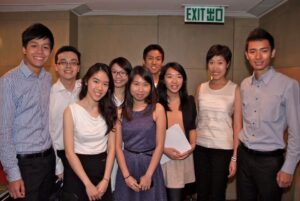
After graduating from the university, I went to work at law firms to earn some money, like a typical law student. Got married, as some people would do. Soap Cycling became part of a fun history until 2017, when David reached out and said that he wanted to expand the board of Soap Cycling and asked me whether I wanted to be in it. I think that the main reason why I joined Soap Cycling again as a board member is that my overall passion for continuous learning has not changed. It’s the same reason why we had to start Soap Cycling back in 2011 – we wanted to use that platform to learn. And I think it speaks not just for me, or David, or the students, but it speaks for everybody involved. So, in 2018, I was back at the charity as a board member, and in 2019, I became the chairman of the board. And this is my third year as the chairman.
Tell us more about Soap Cycling, its main goals, and how it relates to the idea of shared impact?
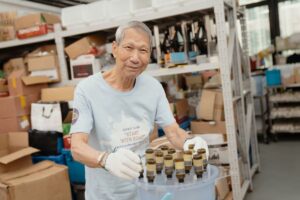
Soap Cycling works in three main streams. Number one is environmental: recycling soap is reducing waste and reducing plastic. For the last four or five years, we’ve been focusing on that a lot. The second limb is on hygiene. Once we’ve recycled all the liquid and solid soap, we redistribute it to the people in need. We used to ship it to Southeast Asia or other Asian countries, but because of COVID, we have been doing a lot more local work here in Hong Kong. The third limb is empowerment. We have this program called MEY, which is taken from the Chinese character 美 that means “beautiful”. The acronym consists of the words for our beneficiaries: M stands for minority, E stands for elderly, and Y stands for youth. Those are the three target segments that we have in terms of empowerment. It’s not just inviting people into the warehouse to scrape soap and say bye-bye, see you later. We provide them with meaningful job opportunities that pay a fair wage.
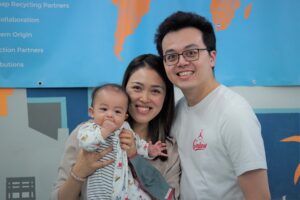
I think that the efficiency of your life is about managing its various aspects – for example, work, family, volunteering, social impact – to maximize what you can get and give. If you don’t manage the resources the right way, they can conflict with each other, and decrease productivity. If you bring two talented people into the same conversation that they don’t want to be in, they will not want to collaborate, discuss, and be humble; they could clash, and the whole team can collapse. But there are also some people who can manage their limited resources in the right way, and so that one plus one can make three. That’s where the shared impact concept comes from. A lot of the time we just need to find ways to help, and receive help, in a happy, willing, and efficient way. And I think that Soap Cycling, overall, is trying to build on this whole concept of drawing the community together to maximize resources and share them broadly.
In May, for example, we did a Soapathon, which is 36 hours of soap recycling. On the other side of the room, there were other Soap Cycling events and sessions going on. There were so many culturally and ethnically diverse people coming into the warehouse and leading workshops. That’s what I mean by one plus one makes three. Everybody chimes in and tries to bring something here and also get something from here.
Soap Cycling has four full-time employees in Hong Kong. And we also have four to eight student interns from HKU every semester, sometimes we have non-HKU interns. Overall, our target is to have around 20 student interns per year. We want our student interns to focus on themselves as much as the course and the organization they work at. We want them to focus on how much they can grow out of that program. So if you ask me, the program helped the students way more than the organization.
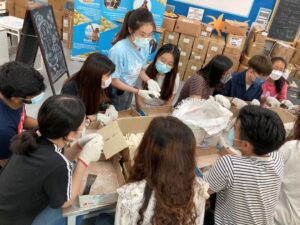
What would be your advice to the Impact Lab students?
Enjoy the process – it’s fun. Because once you get to work, it’s not that fun. So enjoy the nice and safe environment where you are working but without the stress. Of course, there is grading stress, but it’s not the same. You will make mistakes, and that’s fine.
Be open-minded to people who have a completely different world perspective than you have. You are very young, and the world is just opening up for you. Meet as many people as you can, ask questions, and get to know people deeply, and, hopefully, grab some friendships along the way, which makes things interesting. Social enterprises, especially many of the Impact Lab partners, are still operating on a smaller scale, or startup scale of social enterprises. A lot of the time, you just need a very close core group to maintain that momentum.
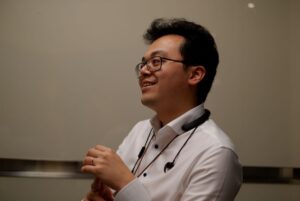 As we know, you are leaving Soap Cycling soon. Could you tell us why you decided to leave?
As we know, you are leaving Soap Cycling soon. Could you tell us why you decided to leave?
I’m leaving Soap Cycling because of my belief that everyone and everything needs new voices, new ideas, and edges. An organization needs that and I need that as well. My motto is, “When you feel too comfortable, that’s the time to leave.”
No matter whether it’s an organization, a job, or a project, when you feel uncomfortable or stressed, or that you need help, that’s fine. You seek help, you scream at night, you cry. Go through that process. That’s fine. But when you stop feeling these things, that’s the time to go. And that’s fine, too. You share your life with friends that you meet and build things with along the way.
I’m feeling more and more comfortable with Soap Cycling. Sometimes, that’s good, but Soap Cycling is also growing too comfortable with me. New people coming in with new eyes will look at that differently. I want it for the organization. I want to have people that are passionate to join the organization.
At Foundation for Shared Impact (FSI), our work is guided by our shared impact philosophy. We promote broad collaboration, freely sharing knowledge and resources, the adoption of data-driven impact models, seeking systems change, and a culture of radical candour.
For about a decade, we have developed an impact-based learning curriculum and empowered over 1,000 students from all over the world through our Impact Lab Course. We have connected scores of social impact organizations with the private sector to facilitate skills and knowledge exchange to accelerate systems change through our Community Connections Program.
Through our Community Business Support program, we have helped 40+ social businesses, including 13 portfolio startups, scale their impact by working directly with founders and team members on building their capacity and scope not just as businesses but as community leaders.
Acknowledgment: This case study was conducted and written by Yana Khaladzinskaya, an Impact Lab intern of the FSI Communications and Marketing team.




